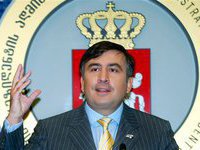Georgia acknowledged launching war in 2008
Prime Minister of Georgia Bidzina Ivanishvili admitted responsibility of Georgia for the outbreak of the war in August of 2008. He stated that the actions of the authorities of the country before crossing the border of Georgia by Russian forces were inadequate. This statement will have tangible consequences, first of all, for President Mikhail Saakashvili.

"The political noose" around the Georgian President Mikheil Saakashvili's neck is getting tighter. He is not yet being investigated, but the new authorities have already talked about the possibility of his interrogation about the events of 2008. The country may begin a new investigation into the five-day war. Prime Minister Ivanishvili spoke in favor of conducting a second investigation of the facts.
During a meeting with the editors of a number of Georgian media outlets, Ivanishvili called the actions of the authorities in August of 2008 inadequate. Georgia's acknowledgement of at least part of its responsibility for the war could seriously affect the country's foreign policy, and above all, the relationship with Russia.
But first of all, this may affect the President who is leaving office this year. "I believe that the government, led by President Saakashvili, acted inappropriately when the fighting began. This refers to the period when the Russian troops had not yet crossed the border. Georgia could have avoided a military conflict. There were no attacks of the magnitude that would require ivolvement of the Georgian army. When a shell got into a house during shelling of Georgian villages, which did not result in casualties, they should have evacuated people from the village and brought international observers instead of using the armed forces. Personally for me a lot in this conflict is not clear, so I welcome the statement by the Minister of Justice on the need for an investigation," said Ivanishvili.
Perhaps the Prime Minister is gradually preparing the public opinion for the fact that Saakashvili, after leaving office, will have issues with the law. In that case, charges of "inadequate actions" during the events of 2008 will clearly be not the only ones on the President's "account."
"I think that Saakashvili should not be surprised if he gets a subpoena. This investigation will not affect the international image of Georgia or the image of the president. I think he should be understanding," said Ivanishvili.
Bidzina Ivanishvili who has repeatedly proven himself as a competent politician, by making a statement about the events of 2008 may have implemented a multi-step operation that would significantly improve the country's position in foreign policy. In any event, Tbilisi at least partially admitted its fault for the war. In addition, it clearly puts the responsibility for the mistakes on President Saakashvili. These two fundamental postulates cannot but cause a positive reaction in Moscow, particularly regarding the perspective of a prosecution of the odious President of Georgia.
The Minister of Justice of Georgia Tea Tsulukiani spoke about the possibility of a new investigation a few days ago: "I do not rule out that the former and current senior officials will be questioned, including the President of Georgia." Most likely, this initiative voids the results of the activity of a special parliamentary commission charged with investigating the events of August 2008. This commission, led by a companion of Saakashvili, Paata Davitaia, no longer enjoys the confidence of the parliament.
Of course, now many in Georgia have forgotten that Ivanishvili made several statements during his campaign about the fault of Saakashvili for starting the war in August 2008. Incidentally, there is another, international investigation into the events of the August war, held by an international investigation team led by Heidi Tagliavini, the former head of the UN mission in Georgia. It is worth noting that the authors of this document believe that at some time the blame for the escalation of the conflict should indeed be attributed to Georgia.
It should be added that such recognition, particularly expressed at such a high level of the "official Tbilisi", according to journalists of a number of publications, will cause great distress among the Russian non-system opposition. Politonline.ru mentioned a similar situation with the "spy rock" (a British intelligence unit placed in Moscow and disguised as a rock). First bloggers and opposition politicians said that it was "an invention of the Russian propaganda", and after confirmation by the UK officials were indignant about the UK playing into the hands of the Russian government. The publication suggests that its readers should go to search engines and search for "August-September 2008," and enjoy reading texts in which network opposition activists and even some leaders and media celebrities accused Russia of" aggression "and enthusiastically discussed how the U.S. would crack down on Russia, and the European Union would impose sanctions and embargoes. It would be interesting to know whether they are ashamed of those tantrums now.
Anton Krivenyuk
Pravda.Ru
Subscribe to Pravda.Ru Telegram channel, Facebook, RSS!


